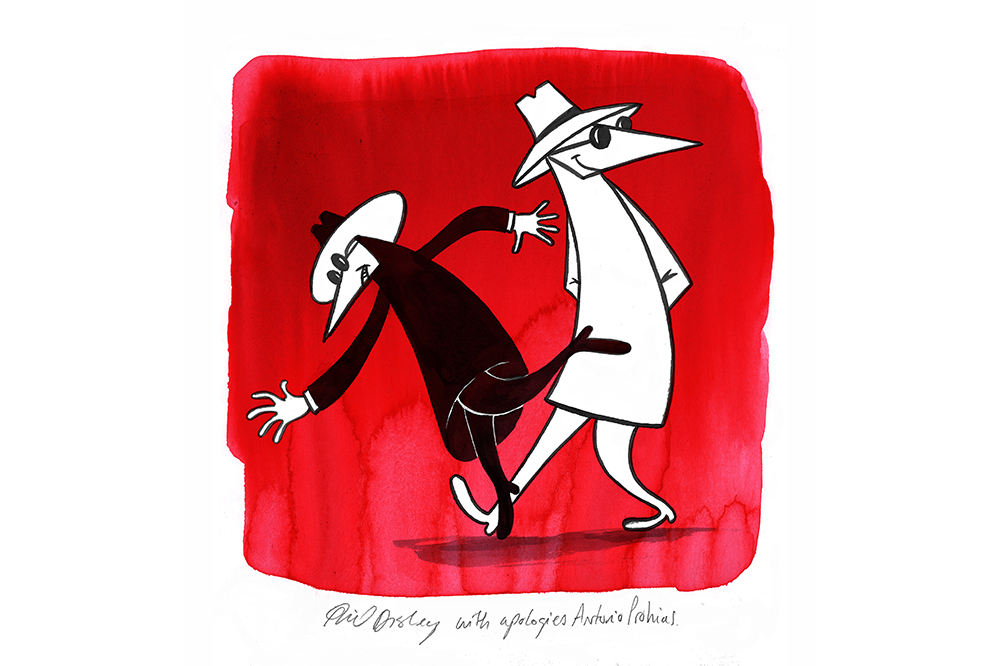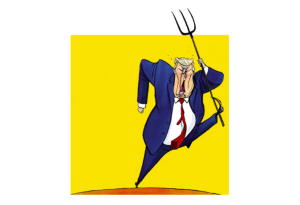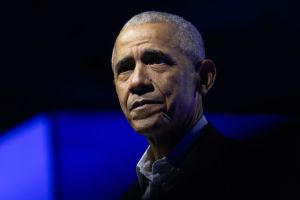This article is in
The Spectator’s November 2019 US edition. Subscribe here.
If Donald Trump is driven from the White House, he’ll blame the Deep State. His belief in ‘the Deep State conspiracy’ was behind the call he made to Ukraine’s president that might now get him impeached. One of President Trump’s former aides, Sebastian Gorka, who’s now a radio talk show host, asked him how the effort to defeat the Deep State was going. Trump said he had already seen off the ‘absolute scum’ at the top of the FBI. ‘With the destruction of the Deep State, certainly I’ve done big damage…I think it’ll be one of my great achievements.’
It’s a minor problem — of no concern at all to Trump — that there is no such thing as the Deep State.
Not in the US, anyway. In Turkey, yes: a secret, permanent government of the military and the intelligences agencies. This is what Trump says he’s up against in America and some of his supporters will believe it. During the 2016 campaign, I met Linda Hall as she stopped to buy a red MAGA cap. She was rail-thin, with peroxide hair and a few missing teeth. She slept with a .38 full of hollow-points under her pillow; her 82-year-old mother had a .45.
This was for the day Barack Obama left office. ‘I guess that’s when it’s all gonna blow.’ She wasn’t thinking of a coup by the Deep State — Trump wasn’t using the term then — but about Isis. Isis was ‘in every frickin’ state’ because of corrupt deals with the people running things. She’d seen this all her life. When she was 18, in Texas, she was kidnapped into prostitution — ‘They put a great big gun in my mouth’ — and went to the cops. ‘They couldn’t do anything… everyone has to go by whoever’s running Texas.’
The crooked cop, the corrupt businessman, the shadowy people ‘running’ everything: the game was rigged and people like her could never win. Linda and others like her probably believe in the literal truth of Trump’s Deep State. They are the audience for Alex Jones, king of the conspiracy theorists, who said on his radio show on inauguration day that ‘they’ were ‘prepping’ for a military coup to overthrow Trump. ‘They are planning to put 50 million Americans in re-education camps.’ Jones’s Washington bureau chief, Jerome Corsi, wrote a book called Killing the Deep State in which he said that the CIA planned to assassinate Trump ‘as a last resort’. This is the logical outcome of a belief that the Deep State is real. Once you accept the premise, anything is possible, anything believable.
Where Trump tweets, others follow. His senior adviser Stephen Miller told Fox News that the Ukraine whistleblower wasn’t to be trusted because: ‘This is a Deep State operative, pure and simple.’ This is useful for the White House. You never have to answer the specifics of an allegation, just question your accuser’s motives. If a shadowy cabal is behind everything, the facts can easily be brushed aside. ‘Of course! That’s what they want you to think.’ President Trump calls Ukraine’s leader from his desk in the Oval Office and tells him about a theory from the further reaches of the internet that it was really Ukrainian hackers who stole the Democrats’ emails during the 2016 campaign. There’s a missing server that will show this. And it’s hidden in Ukraine! It doesn’t matter that his own intelligence services say Russia did the hacking, the names of the Russians responsible listed by Robert Mueller. ‘Of course! That’s what they want you to think.’
A good conspiracy theory must touch on reality from time to time, so Trump has some facts. For a moment, let’s entertain the idea that Trump is right that there is a Deep State and that it fabricated a Russia scandal to overturn the result of the presidential election. He is helped, if not ‘exonerated’, by the conclusion of Mueller’s report that ‘the investigation did not establish that members of the Trump campaign conspired or coordinated with the Russian government’. A former prosecutor called Andrew McCarthy has written one of the least hysterical of the books taking Trump’s side over ‘collusion’. He believes there was never any real basis — no probable cause — for the FBI’s investigation into the Trump campaign.
McCarthy does not accept the term ‘Deep State’ but said there was a systematic bias against Trump in the FBI and the intelligence agencies. ‘There was a feeling in the upper ranks…that Donald Trump was not fit to be president.’ So when the former MI6 officer Christopher Steele came along with what McCarthy calls his ‘shoddy, sensational, preposterous’ dossier, the FBI seized on it to push its inquiry. ‘In a normally, appropriately skeptical law enforcement or intelligence service, people would notice it wasn’t up to snuff. And here, they didn’t. Because they had already decided he was unfit.’ They were confident that the evidence would catch up with their judgment on Trump — but it never did.
Steele didn’t pretend his dossier was anything other than claims from sources that had yet to be proved, though he thinks today they haven’t been disproved either. But there were other reasons to investigate the Trump campaign: intelligence from America’s allies, passed to the CIA, and then on to the FBI. McCarthy believes this was going on as early as 2015 with the head of the CIA, John Brennan, acting as a ‘clearing house’ for information. If that is true, the question is: did Brennan really have enough to instigate the Russia inquiry? President Trump’s supporters question Brennan’s motives. Bob Tyrrell, editor of the American Spectator — no relation — told me Brennan had ‘courted’ Hillary Clinton during the race, hoping she would reappoint him. He had ‘manufactured’ the Russia scandal, Tyrrell said, and now President Trump’s investigation of the investigators was ‘closing in’ on him.
That investigation is being led by the US attorney from Connecticut, John Durham, and it’s into whether intelligence gathering on Trump was ‘lawful and appropriate’. A source told me it was true that Brennan was in jeopardy: Durham was trying to obtain the CIA’s internal memorandum governing the Trump operation and was going to interview Brennan. He would ask if Brennan was running an illegal — because domestic — effort to spy on the Trump campaign. He would ask if the CIA was still doing this after the election (but before the inauguration).
Brennan seems to view himself as a target of the investigation. He told MSNBC he expected to be questioned and he worried that ‘the hand of politics and Trump’ would interfere with Durham’s work. ‘I don’t understand the predication of this worldwide effort to uncover dirt… that would discredit that investigation in 2016 into Russian interference.’ Over on Fox, a former attorney general, Michael Mukasey, said it was a ‘terrible precedent’ to have the CIA investigating American election campaigns. Mukasey often seems to know what the Trump administration is thinking. Ominously for Brennan, he said: ‘Interesting that John Brennan is questioning this. He says he doesn’t see the need for it. By the time it’s over, he may.’
One retired intelligence officer told me that charging a former head of the CIA would be a ‘very high-stakes’ gamble. ‘Brennan’s a far from beloved guy in the IC [intelligence community] but they’ll defend him against Trump’s efforts to criminalize their work in 2016.’ The attorney general, William Barr, and the Department of Justice were trying to recruit some intelligence officers for their ‘jihad’ against the Deep State, he said — spy vs spy — but they hadn’t had much success. ‘No doubt they have moles in various corners of the IC but institutional resistance to Trump is strong. And it’s not partisan, contrary to Fox News myth-making, but bureaucratic.’
Trump’s former strategist Steve Bannon would agree with that. He says there is an ‘administrative state’ but is on record as saying the Deep State conspiracy theory is ‘for nut cases’. He told me that far from being hidden, it was ‘right up in your grill’. Belief in a Deep State was insidious, it robbed you of the confidence that the administrative state could be reformed. It was a ‘crutch that people use when they haven’t done the tough work to change things’. He went on: ‘Unlike a Deep State, which is theoretically almost impossible to take out, you can change this, it just takes leadership… it’s about transparency and accountability. And we have those mechanisms in place. They just have to be used.’
Bannon says the administrative state wants the US to be an imperial power. Rep. Jamie Raskin, a Democrat, agrees, though he talks about a ‘national security state’. He told me Trump had taken ‘populist mistrust of the military industrial complex and… turned it to truly paranoid uses’. A real Deep State would have stopped Trump winning in the first place, he said. It would have leaked the Russia allegations before the election, not after. The People’s House would impeach Trump ‘if I have anything to do with it’. Impeachment seems, as Raskin puts it, overwhelmingly likely. If the Senate convicts, would Trump call on Linda Hall and her 82-year-old mom to march on Washington to fight the Deep State?
If so, they would be fighting a figment of his imagination. Last year, my colleagues and I were contacted by a US intelligence agency. The reason: we had met someone introduced to us as a former Russian spy, ‘an ex-colonel’. The ‘colonel’ told us he had seen one of the ‘Trump tapes’. They were for sale: $10 million. But then he started talking about how the Jews ran the world, how Putin had a body double, how Trump and Putin were members of a secret, Masonic order. We dismissed him as a fantasist… until two men from the US intelligence agency showed up. The colonel was real and they wanted to meet him. So there we all were, sitting with the colonel as he talked about Putin’s inner circle gathering in a dacha to watch the Trump tapes. They were knocking back vodka, he said, slapping their knees, creased with laughter, tears streaming down their faces: ‘That is our candidate for president of the United States!’
If Trump could see us now, I thought: this is the Deep State at work. But the intelligence officers didn’t want to hear about the ‘US election operation’. They wanted the location of a Russian safe house, the name of an officer, the minutiae of their craft. They were cautious, bureaucratic, terrified of anything ‘political’. This was the shallow state, not the Deep State.
This article is in The Spectator’s November 2019 US edition. Subscribe here.

























